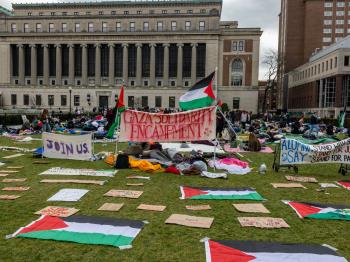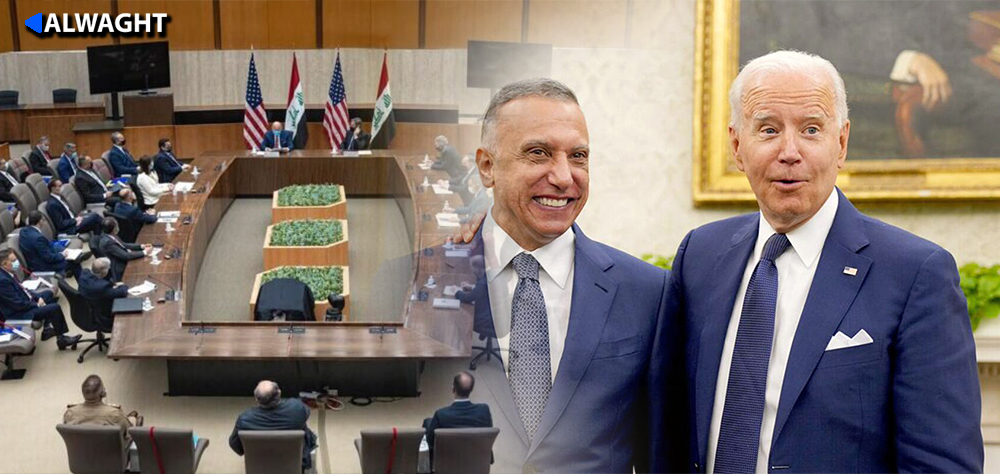Alwaght- Seven years after US military redeployment to Iraq under the excuse of fighting the ISIS terrorist group, a statement coming out of the fourth round of the US-Iraq strategic talks set a date for American withdrawal. However, the statement highlights advisory stay of the American forces in the Arab country, stirring substantial Iraqi opposition and very likely pushing Iraq into a period of new duel between the US and resistance forces.
Ultimate pull-out by end of 2021
At the end of the fourth round of strategic talks, the two sides agreed to withdraw of all US troops by the end of this year. The agreement was announced in a final statement issued Monday, according to Shafaq News.
Iraqi Foreign Minister Fuad Hussein and US Secretary of State Anthony Blinken chaired the Baghdad and Washington delegations for talks, which began on June 11, 2020, as part of the 2008 Strategic Framework Agreement for Friendship and Cooperation. Representatives of the Iraqi government, including politicians of the Kurdistan Regional Government (KRG), were also present at the talks.
According to the joint statement, the two sides reaffirmed the importance of these issues, which they say strengthen the long-term strategic partnership defined in the 2008 pact, and focused on key issues including regional stability, health, climate change, energy efficiency and independence, humanitarian aid and human rights, economic cooperation, cultural and educational exchanges.
Under the statement, the Iraqi government reiterated its commitment to protect members of the so-called international coalition operating under the US leadership to advise and train the Iraqi security forces, and stressed that all anti-ISIS forces are operating in Iraq at the invitation of the government. The two sides also stressed that the military bases hosting the US and other Western forces are Iraqi facilities operating under Iraqi laws, not US or international coalition laws, and that international personnel are present in Iraq solely to support the Iraqi government in its battle against ISIS.
After the discussions of the technical teams, security relations should be completely limited to providing advice, training and intelligence, and that US forces should withdraw from Iraq by December 31, 2021, they further agreed. The US intends to continue support to the Iraqi security forces, including the Kurdish Peshmergas, to "increase their ability to respond to threats."
Welcoming the full US troops exit
The agreement on a date for the US exit was met with massive reactions from political figures and parties. President Barham Salih in a Twitter message decided that the results of the talks with Washington were "crucial" to strengthening Iraq's stability and national sovereignty and found them an outcome of efforts by government of Prime Minister Mustafa al-Kadhimi and support offered by "patriotic forces" and conforming to authority of the central government in Baghdad.
"The Iraqi interests rest on boosting the state institutions and support to the sovereignty and national and independent decisions of the country," his message continued.
Speaker of the parliament Mohamed al-Halbousi was next to comment. A Twitter post of him read "Iraq is taking firm steps in the course of full realization of its potentials." He found the agreement the realization of the national sovereignty and a powerful Iraq and congratulated the PM and the negotiating team for the "achievement."
Also, Muqtada al-Sadr, the chief of Sadr Movement, in a post thanked the "national resistance forces" in Iraq and added that "today the occupiers are pulling back all of their combat forces from Iraq." He thanked the PM al-Kadhimi for his efforts and highlighted the conditions he set for stopping military operations against the occupation.
"Given that we demonstrated conditions before and now they are met, the military action of the resistance must be stopped absolutely, and the Iraqi security forces, including the army and police, must be supported to restore and extend security on Iraqi lands and to banish the specter of terrorism, violence, intruders, and pretenders of resistance," al-Sadr asserted, adding: "Iraq [moves] towards independence. We await sovereignty and prestige."
Fatah Coalition, the political branch of the Popular Mobilization Forces (PMF), in a statement welcomed the withdrawal as a "national achievement" and a positive step towards Iraqi territorial sovereignty. The coalition called for pursuing the practical implementation of the agreement by the officials and thanked the negotiators for the job.
Sayed Ammar al-Hakim, the leader of National Wisdom Movement, appreciated what he called the "important national diplomatic achievement."
Nasr al-Shomari, the deputy secretary-general of the Al-Nujaba Movement, told the Lebanese broadcaster Al-Mayadeen "Iraq does not need the American forces."
"American crimes in Iraq, especially the assassination of the leaders, were carried out by the air force. We do not trust the Americans. Al-Nujaba does not agree with presence of any American troops in Iraq. We want a complete withdrawal of American troops. Who guarantees that American forces will not be reinforced in Iraq under the title of advisers? The Iraqi airspace is controlled by US forces," he told Al-Mayadeen.
Shebel al-Zobaidi, the commander of Imam Ali Brigades which is a unit of the PMF, in a statement congratulated the end of the foreign presence in Iraq to the people and government.
"This is the second time the Iraqi people have proven their patriotism and commitment to the principles of dignity, showing that they are united against whoever does not need good to this country," al-Zobaidi's statement read.
Washington resorts again to advisory presence
Undoubtedly, the most important part in the strategic agreement between the US and Iraq is the principle of the continued advisory presence. Since the Iraqi parliament approved the bill to unconditionally expel the foreign forces in January 2020 following the assassination of Iran's top anti-terror General Qassem Soleimani and his Iraqi fellow Abu Mahdi al-Muhandis, Washington has resorted to an array of ways to circumvent the Iraqi law.
Under the new conditions, the US is clinging to advisory presence in Iraq, a total failure experience in both Iraq and Afghanistan over the past two decades. The US and NATO for years undertook the responsibility of the Afghanistan government forces training and equipping with huge budgets. However, shortly after the Western forces announced withdrawal from the Central Asian country, the Taliban fast seized large parts from the government forces. Washington seems to seek applying the same scenario to Iraq.
Iraq experienced such scenario not long ago. When in 2014 ISIS fighters assaulted Iraqi cities, the Western-equipped Iraqi army declined to resist and the terrorists seized Mousl in a matter of hours and much of Nineva and other provinces of days, reaching 30 kilometers to the capital Baghdad and committing barbarous crimes against the civilians. The Iraqi political parties do not seem to allow repeat of the scenario.
Continuation of tensions over complete withdrawal
All the various reactions to the agreement apparently demonstrate that the Americans struggle to stay under the cover of advising, training, and supporting the Iraqi forces. Washington specifically plans backing to the Kurdish Peshmerga forces, signaling that the Americans plan for continued influence on the Iraqi political equations. Relying on its past approach, the US pursues any way to stay.
On the opposite side, a majority of Iraqi factions insist on the withdrawal. They cannot bear stay of the Americans, no matter what the title is, and want full exit. Some anti-occupation forces asserted they will continue attacks "until full pull-out of the occupiers." This signals a full-scale duel between the US resistance to exit and the Iraqi insistence on it is brewing.



























